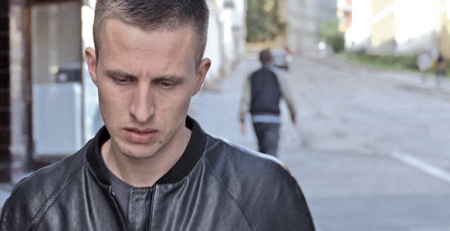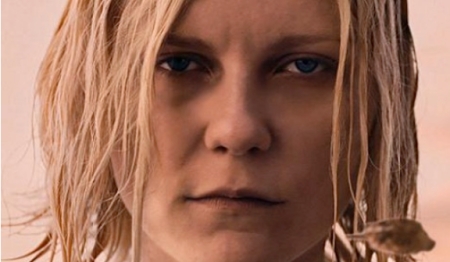

By Kim Voynar Voynar@moviecitynews.com
TIFF ’11 Reviews: Oslo, August 31 and Melancholia
Oslo, August 31
One of the last films I caught at TIFF this year, almost by accident, was Oslo, August 31, the sophomore effort of Reprise director Joachim Trier. Oslo, August 31 reunites Trier with Anders Danielsen Lie (who played Phillip, the troubled writer of Reprise) in this spare film about addiction, the choices that define a life, and what happens when you’ve screwed it all up so badly that you can’t see a way back out through starting over.
The film opens with a spate of “I remember ….” voice-over memories of growing up in Oslo from a chorus of unseen voices, then unceremoniously introduces us to Anders (Anders Danielsen Lie), a 34-year-old recovering addict, once a promising writer, now a recovering, suicidal addict who’s about to get out of rehab.
Shooting in Oslo, and setting the film as summer transitions into fall, Trier uses camera angles and shadows to give Anders’ return to Oslo a closed off, foreboding vibe that plays well with the sense that the recovering addict feels already that all the doors are shut, his path already chosen. It’s clear that Anders doesn’t believe in himself, so it’s hard for us to believe in him. Trier chooses not so much to foreshadow the ending of the film with its beginning, as to deliberately telegraph it, an effective dramatic device that forces the audience to feel Anders’ sense of despair, isolation and hopelessness.
Anders returns to Oslo, where he played out his descent into addiction at raves and wild parties, for a job interview that he deliberately bungles. He reaches out to an old friend, whose “together” life doesn’t, in the end, seem all that fulfilling. His parents are off in Nice, and are in the process of packing up the family homestead to sell everything — in part because of the expenses Anders’ addiction and recovery has cost them. His ex-girlfriend won’t answer his repeated calls. Even his sister sends a friend to meet him, rather than showing up herself. Can all this foretell anything but gloom and misery?
Trier plops you right into the heart of Anders’ despair, leaving it to the viewer to feel what they will feel about Anders and whatever his fate may be. If you’re a recovering addict yourself, or have one in your life, perhaps you’ll find yourself rooting for Anders in spite of the self-destructive solipsism that drives him; or conversely, perhaps you’ll find that you lack patience for this otherwise intelligent guy who, as he says himself, had everything handed to him and just fucked it all up anyhow.
There’s an underlying theme lying beneath the bare, cold surface of this film, though, that speaks to societal views on drug use and abuse, and the need for parents to provide the foundation of values that help steer a young person through the treacherous waters of late adolescence and early adulthood. At what point does the parents’ responsibility end and the young adult’s begin? As Anders ponders his descent into addiction, appearing baffled by just exactly how his life got so far off track, he ruminates about his upbringing. His mother was in favor of legalizing drugs. His parents were liberal. They didn’t provide much in the way of limits, and maybe they should have. What we don’t hear is Anders ever really accepting responsibility himself for his choices, other than the admission that he fucked up. Well, yes. But now what?
The “now what” is what drives the film as Anders meanders along, plunging headfirst, on his first day of freedom, back onto his self-destructive path. It’s a relentlessly depressing, gloomy sort of film, and yet I was fully engaged to the end. This is a quieter, more intimate film than Reprise, driven almost solely by Lie’s melancholy, soulfully intense performance. There’s an unapologetic, bare feel to the film from start to finish, confidently executed and unwavering in its perspective. It’s not easy to follow-up a freshman effort as solid as Reprise, but Trier’s steady hand here shows that his first film wasn’t just a fluke, and that he still has much to say and explore.
Melancholia
Where Joachim Trier’s Oslo, August 31 is stark realism, his distant cousin Lars Von Trier’s Melancholia, which also deals with a depressed character, is a gorgeously stylized view of the coming of the end of the world as seen through two sisters, the emotionally unstable Justine (Kirsten Dunst) and the together-on-the-surface Claire (Charlotte Gainsbourg).
The film opens on the eve of Justine’s wedding to understanding, affable Michael (Alexander Skarsgård), with a reception at the looming, stunning estate owned by Claire and her uptight husband John (Kiefer Sutherland), whose patience with his wife’s family and their utter lack of respect for anything resembling polite societal decorum is wearing thin. Justine, who’s struggled with a sense of dark, inexplicable foreboding her entire life, notices a new star in the night sky. Only it’s not a star, it’s a planet, Melancholia, and it’s on an intersecting path with Earth. Will it pass us by, giving us only a show of the most spectacular event ever to occur in our lifetime, or does the coming of Melacholia herald our doom?
Von Trier pretty obviously telegraphs the answer to this question from the beginning, making it clear that this film is about how these particular characters react and interact within the context of what’s happening, more than the event itself. Whether the world is actually going to end or not is less important than whether a character thinks it is, at any given moment. The characters themselves, particularly Justine, Claire and John, arc and change and twist around each other over the course of the film as well; is Justine the emotionally disturbed sister and Claire the sane one, or has Claire just found ways to compensate for her own anxieties and better closet her own demons?
Dunst has been justifiably lauded for her performance in Melancholia, and it’s by far her most powerful turn. In the early scenes, Justine struggles against her own melancholy, attempting to stay connected but ricocheting between manic instability and inability to function like a ball in a roulette wheel, until she lands, exhausted, into a full-on, crippling depressive state. Dunst is believable every second she’s on the screen, and the transparency and transformation of her features: the benign mask of a smile when she’s engaged with others, to the sudden flatness not just of affect, but of her entire being, when the depression is dominating her, is strikingly spot-on.
For her part, Gainsborg elevates a role that could have been mere caricature, a foil to Dunst’s showier performance, into something more subtle and nuanced by the fragility she brings to Claire in the film’s second half. And Sutherland plays well off both the sisters, concealing his own insecurities by smug bravado and intellect almost to the end.
Relative to much of Von Trier’s work, Melancholia is one of his more accessible films, a visually dense, poetic allegory about the end of life as we know it, as seen through these people and how they face it. The director immerses you in this stylized stage of the world on which his character play out their parts, leaving it to his actors to transform the somewhat simplistic symbolism into something deeper and more meaningful. He could be said to be somewhat weak here in structure and character arc, but I think that’s largely because he develops the characters more through how their actions impact those around them, and on how others react to them, than through overtly spelling things out.
Like all of Von Trier’s work, Melancholia requires seeing beyond the surface of what he shows us to find the connections between his characters and ourselves. And ultimately, what he has to say through his tale of catastrophic proportions is as much about death in all its smaller iterations, as it is about the death of a world.
















